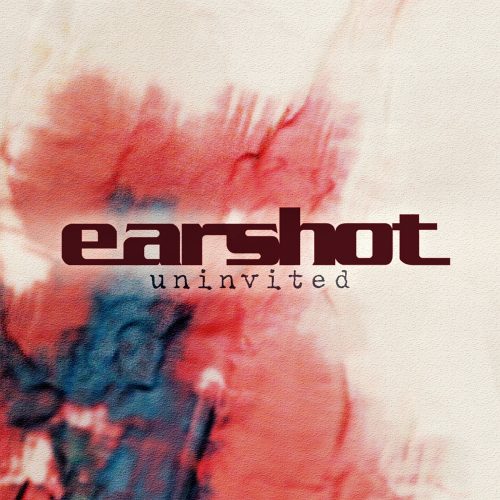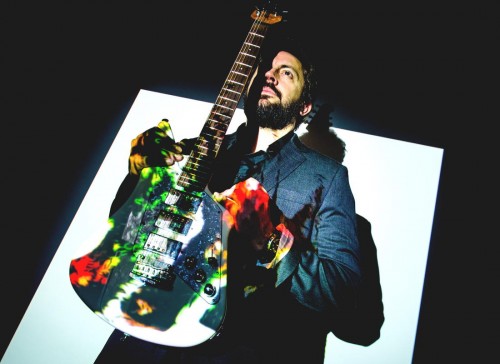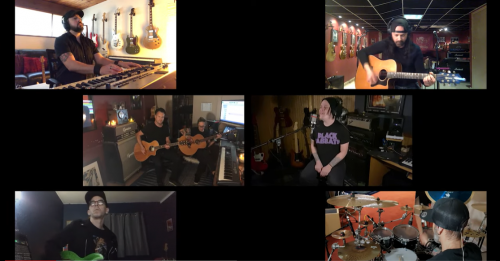Recording remotely is standard operating procedure for bands during the coronavirus lockdown, but Earshot was ahead of the curve. With members spread across the country, the band, known for the 2002 hit “Headstrong,” recorded their parts separately for their new single, a cover of Alanis Morissette’s “Uninvited.”
Another interesting twist: A male singer, Will Martin, taking on the song, which was pitched to the group by new guitarist Aaron Fink, the Northeastern Pa-based former Breaking Benjamin member.
“I mean, it was interesting to me,” says Martin from Hollywood, where he’s based. “My interpretation of the song is a little bit different now that I know what she wrote it about. My initial interpretation was, for a lack of a better term, a stalker. Flipping the song to a woman obsessed with a man was kind of the approach I took with this one, but I tried to keep it faithful to the original.”
Fink, who stayed in touch with Martin after Breaking Benjamin and Earshot toured together years ago, said he “always loved that song.”
“Wil had called me and we had been working on our own songs, original material,” Fink says. “But in the meantime, he’s like, ‘Let’s bridge the gap between the old catalog and the new stuff coming out. What if we did a cover song?'”
After Fink suggested “Uninvited,” he got to work on a new arrangement, “trying to figure out how to twist it up enough that it sounds like its own thing and has its own identity rather than paint-by-numbers.”
The guitarist says that when working remotely, “you lose a little bit of that fraternity vibe, or the hang and the friendly stuff. But in the modern era you can make music through emails and stuff.” Most of the work was done at his home studio, were he tracked keyboards, and the other guys “added their flavors”; Martin recorded his vocals in a studio in LA before the lockdown. Martin and Fink co-produced the track.
Joining Martin and Fink the band are guitarist Andy Stafford, bassist John Novak (also from NEPA) and drummer Mike Sylvia. The new lineup debuted at The Bomb Factory in Dallas, Texas, last year.
“It was crazy. There were no rehearsals,” Fink says. “Everyone lives in different states. [Martin] just sent a list of songs. I’m an ear-trained musician anyway, so I can kind of listen to something and figure it out. It was pretty fucking wild. I never did anything like that before, besides like a jam sesh down at the local club. We never did a proper show [before that]. I had to kind of bring my A-game mentally.
“But it was fun. I had seen the band before back in the day. Wil sounded as good as ever, and we gelled as the night went on. We did a couple of shows, and we’ll see what happens in the fall when the world comes back together hopefully.”
Earshot is working on an EP, their first release since 2015’s “Aftermath” EP. Formed in LA in 1999, the band signed to Warner Bros. and released the debut album “Letting Go” in 2002, which included “Headstrong” as well as rock radio tracks “Get Away.” The band landed support slots on tours with Stone Temple Pilots, Staind and Kid Rock.
“We came out of a really interesting time because we were kind of in this transition between the rap-rock, nu metal stuff and more of the, I don’t know what you would call it, like a post-punk-sounding thing,” Martin says. “For me, I’ve always been a huge fan of the ’90s grunge era, and so I always kind of favored that influence. We always kind of felt like the odd band out a little bit. Our very first tour was with Hoobastank, it was also their first or maybe their second. We played little clubs, it was a lot of fun and always packed.”
Like seemingly most artists in today’s music industry, Earshot is no longer on a major label. Fink’s other current project, the reformed NEPA-based hard rock band Lifer, formerly signed to Universal, also releases its music independently. He also was on Disney-owed Hollywood Records with Breaking Benjamin.
Asked about the transition from big-budget, major labels to the indie world, Fink laughs and says “it sucks.”
“I’m also in a band called Lifer that I started in the late ’90s, and we’re in a similar situation,” he says. “We had like a hardcore fan base and took some time off, and now we’re trying to reinvigorate it. It’s a different world. It’s confusing to someone that’s been around the block a few times like myself. I barely recognize the industry anymore. I got like a book about the new ways and I’m trying to acclimate myself to the new ways.”
Fink makes an interesting point about the expectations of fans staying the same while their spending habits haven’t.
“People still expect full-length albums that are awesome but not to pay,” he says. “I’m a fan of music too, but fans will demand full albums that are supposed to be badass records. Supply and demand is at a weird spot.”
Fans of Fink’s work from his previous bands that are not familiar with Earshot should find some common threads.
“It’s in the same genre, I think,” he says, “where it’s like melodic, hard rock. Start off with riffs and go into a little verse part and a big, shiny chorus. I’ve always even a fan of that kind of stuff. All the bands that I’ve been in, we always worked toward and wrote like that and always went for hooks and things of that nature. I gravitate toward that and I assume that’s why I ended up in some of those bands.
“You find some balance between the heaviness and some crunch but also like hooky, so a blend of that stuff that musician-type guys might like. There are parts where you can smash a beer can off your head or a chorus where chicks might like it.”




Leave a Reply